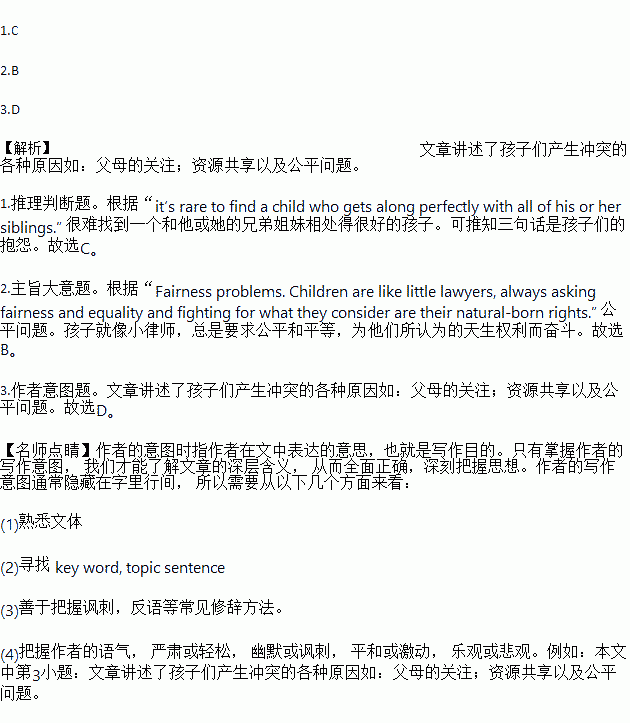题目内容
“She goes to the movies with her friends! How come I can’t go?”
“You love him more than me!”
“I wish I were an only child!”
Parents have heard them all when more than one child resides under their roof. Although siblings(兄弟姐妹) can be the closest of friends, it’s rare to find a child who gets along perfectly with all of his or her siblings.
Kids aren’t always the most rational of human beings----especially younger children. Sometimes, the smallest issue can turn into a major battle and strain a sibling relationship to the breaking point.
Attention. Children are always vying(竞争) for their parents’ attention. The busier the parents are, the greater demand is for their attention and the less they can focus on each child. When there’s a new baby, it can be hard for the other child (or children) to accept losing his or her position as the centre of attention. Sometimes the parents’ attention is focused on a child who is sick or has special needs. Kids will act out and misbehave to get the attention they want if they feel like they’re being ignored.
Sharing.Most homes don’t have unlimited resources. That means all siblings will unavoidably have to share at least some of their things. Giving up a toy or other favorite possessions to a sibling can be especially hard on young children.
Unique personalities. Your oldest child might be the headstrong one while the youngest is quieter and more introverted. Differences in character can lead to clashes. Age and gender differences can also lead to sibling fighting.
Fairness problems. Children are like little lawyers, always asking fairness and equality and fighting for what they consider are their natural-born rights. A younger sibling might complain that her elder sister goes to a concert and she has to stay home, while the elder sister complains that she has to babysit her little sister instead of going out with her friends. Feeling of unfair treatment and sibling jealousy can lead to hate.
1.The first three sentences are a kind of _______.
A. warning B. requirements
C. complains D. doubts
2.From the last paragraph we learn that _______.
A. children don’t like to do things for parents
B. children expect to be treated fairly
C. children have the right to play outside
D. children want to become lawyers
3.The purpose of writing this passage is to _________.
A. introduce the different characters of children
B. require parents to pay equal attention to children
C. give advice on dealing with sibling rivalry
D. explain the root of sibling conflict


 y what they cannot ______. So far I've witnessed acts of cruelty against those who are ______ on a daily basis. Ryan is a prime ______ of how people who may be different are still as worthy as others. Since his diagnosis, I have ______ judging people and tried to get others around me to do the same. Ryan would never ______ somebody because he doesn't like the way he/she looks or dresses. He welcomes all people into his life, and I ______ myself because I have learned to do the same.
y what they cannot ______. So far I've witnessed acts of cruelty against those who are ______ on a daily basis. Ryan is a prime ______ of how people who may be different are still as worthy as others. Since his diagnosis, I have ______ judging people and tried to get others around me to do the same. Ryan would never ______ somebody because he doesn't like the way he/she looks or dresses. He welcomes all people into his life, and I ______ myself because I have learned to do the same. in the US conducted a series of experiments to examine food’s role in earning trust.
in the US conducted a series of experiments to examine food’s role in earning trust.